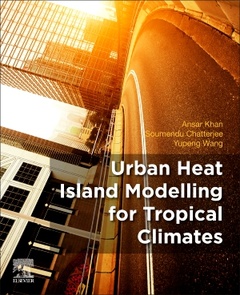Description
Urban Heat Island Modeling for Tropical Climates
Authors: Khan Ansar, Chatterjee Soumendu, Wang Yupeng
Language: English
Subjects for Urban Heat Island Modeling for Tropical Climates:
Keywords
Analytical hierarchy process; Beta distribution; Fractal net evolution approach; Instrumentation; Kolkata metropolitan area; Land use and land cover change; Land use land cover; Local climate zone; Long-term thermal parameters; Microclimate variation; Mitigation; Modeling; Monitoring; Monowindow algorithm; Numerical simulation; Observations; Policy-relevant data; Regional climate model; Scaling; Spatial multicriteria evaluation; Support vector machines; Thermal fields; Transformation matrix; Tropical climates; Two-class kernel logistic regression; UHI mitigation strategies; UHI modeling; UHI scaling; Unprecedented urbanization; Urban canopy model; Urban climate; Urban heat island effect ratio; Urban heat island; Urban policy; Urban thermal field; Urbanization; Weather research and forecasting model
146.54 €
In Print (Delivery period: 14 days).
Add to cart298 p. · 19x23.3 cm · Paperback
Description
/li>Contents
/li>Readership
/li>Biography
/li>Comment
/li>
Urban Heat Island Modeling for Tropical Climates takes into account the different urban physics in tropical environments, presenting a way of UHI scaling for tropical cities. Topics include measuring, modeling and proper mitigation strategies, which account for the surface energy balance of tropics. Tropical cities are more susceptible to the effects of projected global warming because of conditions in tropical climates and the rapid growth of so many cities in this zone. The need for research on measuring, modeling and mitigation of UHI effects in tropical cities is of growing importance.
This book walks through the basics of Urban Heat Islands, including causes, measurement and analysis then expands upon issues as well as the novel techniques that can be used to address issues specific to the region.
1. Context and Background of Tropical Urban Heat Island
2. Characterizing Thermal Fields and Evaluating UHI Effects
3. UHI Drivers in Modeling Urban Thermal Environment
4. Scaling UHI and Microclimate Environment
5. WRF/UCM Simulation for City-scale UHI Modeling
6. Simulating Micro-scale Thermal Interactions using ENVI-met Climate Model
7. Future Research for Tropical UHI
Applied Climatology, Climatology, Urban Climate, Urban Environment
Soumendu Chatterjee is a professor and chair of the Department of Geography at Presidency University in India and was formerly a member for the Commission on Hazard and Risk of International Geographical Union (IGU). His current research focuses on Numerical Weather Prediction (NWP) modeling in the context of the dynamic nature of terrestrial and atmospheric phenomena, biophysical systems, and human adaptations.
Yupeng Wang is a distinguished research scholar in the Department of Human Settlements and Civil Engineering at Xi’an Jiaotong University in China. With past projects including urban microclimates and heat island mitigation measures, he continues to focus his research on urban heat islands, sustainable urban development, and urban environmental simulation and evaluation.
- Reviews topics related to understanding the fundamentals of modeling and impacts of urban heat islands
- Covers many techniques, from remote sensing, to numerical modeling and then applying them to urban climate studies in general, and in tropical cities
- Describes the scaling of urban heat islands based on long-term seasonal thermal parameters as feature-based classification systems using a probabilistic and fuzzy logic approach, unlike local climate zones (LCZs)
These books may interest you

The Urban Heat Island 122.46 €



